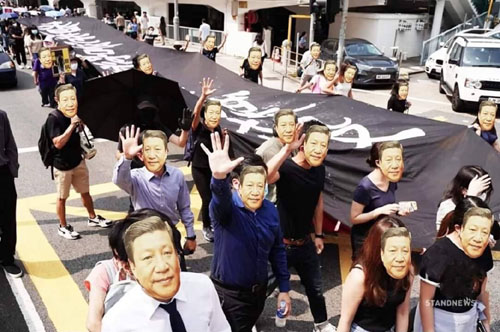by WorldTribune Staff, July 3, 2023
It used to be that July 1 was a day of celebration in Hong Kong. It marked the day in 1997 that Great Britain handed over control of Hong Kong to China. But almost immediately there were signs that a city renowned for economic freedom was coming under the control of Chinese Communist Party leaders in Beijing.
Annual protests on the anniversary of the Tiananmen Square massacre telegraphed Hong Kong’s defiant spirit of independence to the world. Throughout the last half of 2019, communist authorities lost face after failing to stop massive daily protests by mainly very young demonstrators, many of whom had written their wills. They were willing to risk their lives to preserve the economic, press and religious freedoms that made Hong Kong unique.

Finally, in a year of dramatic non-military assaults on the international community including its handling of the Wuhan virus outbreak, the CCP under Xi Jinping took action. On June 30, 2020, one day before the traditional day of celebration, it imposed a new security law on Hong Kong that ended whatever autonomy the city had retained after 1997.
The implications for Taiwan and the dynamic Indo Pacific region are ominous.
“The scope of Beijing’s plans are now clear. This is a constitutional coup. The safeguards which have historically defended human rights in Hong Kong have been shattered. Rule of law has been replaced with rule by law — and the Communist Party’s word is law,” Johnny Patterson wrote in a July 31, 2020 analysis for the Spectator.
“One might think that Chinese authorities, having quashed the pro-democracy protests that erupted in 2019, would ease up. After all, they’ve shuttered all free media, neutered judicial independence, destroyed civil society and suppressed all political opposition,” Josh Rogin noted in a July 1, 2023 analysis for The Washington Post.
New York Democrat Rep. Ritchie Torres, a member of the House Select Committee on the Chinese Communist Party (CCP), said: “In the early 1990s, the West was swept up in the euphoria of the post-Cold War era. We fundamentally failed to internalize the lessons of the Tiananmen Square massacre and what it told us about the brutality of the Chinese Communist Party.”
Authorities installed in Hong Kong by the CCP now go “out of their way to shut down any reference to the 1989 massacre of student protesters in Tiananmen Square,” Rogin noted. “Many Hong Kongers were jailed and charged with ‘inciting a riot’ for simply lighting candles in June 4 vigils commemorating the Tiananmen victims.”
Jimmy Lai, the former head of the largest independent Hong Kong media outlet Apple Daily, was one of the Hong Kongers imprisoned by the CCP.
Lai, 75, had already finished serving 14-months in prison for daring to recognize the Tiananmen massacre. He is now serving an additional five years and nine months “on trumped-up fraud charges,” Rogin noted. “He could go on trial again as early as this September under Hong Kong’s pernicious ‘national security law,’ which the authorities apply liberally to hand down harsh prison sentences to any opponents of the crackdown.”
According to the Hong Kong Democracy Council, communist authorities have jailed more than 1,500 political prisoners since 2019, half of whom are under the age of 25.
“The CCP’s efforts to shut down any inkling of criticism have reached a high level of paranoia,” Rogin wrote. “For example, Hong Kong authorities are shutting down a child’s clothing retailer called Chickeeduck, which they accused of “advocating violence” because the stores displayed pro-democracy artwork and protest messages.”
The communist regime in Beijing is also trying to shut down musical criticism of its Hong Kong policy in Western countries. This past month, Spotify and other streaming services removed the protest song “Glory to Hong Kong” from its libraries worldwide before restoring it after widespread public backlash.
For the CCP, “too much repression is never enough,” Rogin added. “China is becoming more emboldened. That spells danger for Taiwan and the rest of the world — unless the lessons of Hong Kong are learned.”
“The most important lesson the world must learn from the tragedy in Hong Kong relates to Taiwan,” Rogin added. “Hong Kong proves that Beijing’s proposal of ‘one country, two systems’ is a delusion — and that any promises Xi makes regarding Taiwan’s continued autonomy under reunification are worthless. Xi’s China is a totalitarian regime that seeks nothing less than total control of China and everything it sees as part of China, including Hong Kong and Taiwan.”
Membership . . . . Intelligence . . . . Publish
